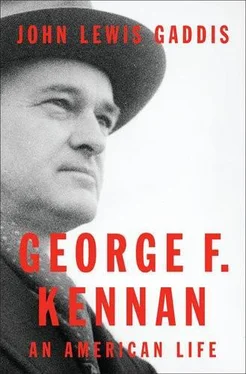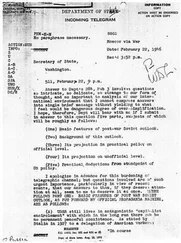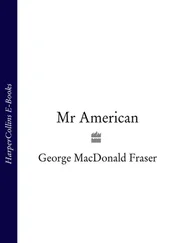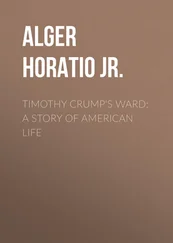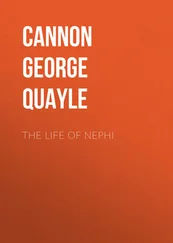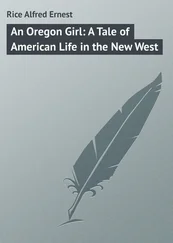Here they separated, and George, unsure what to do next, decided to hitchhike to Schenectady, where Constance and her husband lived. He arrived at about midnight, and “[t] hey pretended to be real glad to see me.” “Oh, I’m so glad you’re home, Connie,” she remembered him having said. “I thought I’d have to sleep in the park.” Fed, clothed, and refinanced, George took a Hudson River boat to New York and then went on to Princeton, closing out his diary: “Here ended, by exhaustion, the account of the European trip of George F. Kennan.” 41
“The only thing I’m really qualified for,” George had written Jeanette during his first year at Princeton, “is to play in a dance orchestra.” He had, by then, mastered the piano (despite being denied lessons at home), the cornet (an outgrowth of bugling at St. John’s), the banjo, the guitar, and—to the amazement of his half-brother Kent, who would become a distinguished musician and composer—the French horn, “a fiendishly difficult instrument.” George played in orchestras and dance bands throughout his college years, with the latter generating badly needed income. “Marvelously peppy party,” he noted of one dance. “[E]ven I enjoyed myself—profitable too.” But as he had pointed out to his sister, this was not a profession “as a rule, followed by Princeton men, as a life occupation.” 42
There had also been a succession of physically demanding summer jobs—cherry-picking, tree-trimming, even working on a railroad during a strike and having to cross picket lines—but these were not right for a Princeton graduate either. There was, to be sure, his father’s profession, the law, and at the end of his sophomore year George had “fairly definitely” decided on that path. But Kent senior was “too modest and honest, too conscious of his remoteness from the modern age and his inadequacy as a guide,” to press his son to follow his example: George recognized him as “a shy, lonely, and not very happy person.” Perhaps with their father in mind, he lamented to Jeanette at about this time that “[w]e all run along with our heads in the clouds, most of our lives, hoping for some kind of great thing, until we suddenly realize that we’ve almost come to the end of our rope and nothing great has happened at all. It must be sort of a disappointment.” 43
Like most college students, George sought in his summer travels something great, even if neither he nor Nick had much of a sense of what that might be. In a way, he found it: the weary young man who arrived back in Princeton at the end of August was not the one who had happily hitched rides out of it the previous June. The trip had been both a flight from and an assumption of responsibility—a liberation but also a test. It occasioned his first sustained descriptive writing: George found words to reflect what his eyes had seen and his body had experienced, a skill he would never lose. And like most such trips, this one explored an inner self as well as a wider world. “I am making a strong effort,” he wrote at one point, “to be more equable in temper and disposition, by restraining myself when I find myself too congenially inclined.” 44
George came back from Europe with firmer views about himself and his future. He resigned from Key and Seal, thereby resigning himself to his bleak, though principled, senior year. He had also decided against law school. “I will probably disappoint you,” he wrote his father, but “three more expensive years of education and another long period of time required to ‘get headway’” did not seem to make sense. “I have learned a few things, and one of them is that I don’t want to be poor…. [T]he ordinary money-making games don’t particularly appeal to me [but] the results of them do, and I have enough confidence in myself to think that I can make a fair success at almost anything (except salesmanship) if I go into it for all it’s worth.” The only scheme that suggested itself, however, was well ahead of its time: “I figured it all out how I can make my millions by starting an airplane express company in the United States; I’ ll be the Harriman of commercial aeronautics.” 45
The best argument George made against law school, however, was one that Kent senior, who had himself traveled and worked abroad as a young man, could hardly question: “Very few of my ancestors, if any, can have been living such a restrained and quiet life at the age of twenty-one… it makes me very restless. I don’t fit well in a leisurely life.” The European trip, for all its travails, had demonstrated that. George made few references to home in his diary that summer, but when the harbor at Genoa reminded him of Milwaukee, he pointedly added that it would be a “misfortune” if he had to go back there. 46
So what to do? Foreign languages came naturally: George’s family and Milwaukee Normal had equipped him with German, and he had taken Latin and French at St. John’s and Princeton. Professors Green, Hall, and Sontag had had their influence as well: “I had enjoyed the study of international politics and had prospered in it.” George recalled having studied history and politics “with increasing enjoyment and success.” It made sense, therefore, one day in January 1925, to drop in on his international law professor, Philip M. Brown, to ask about becoming a diplomat. Brown was encouraging and discouraging. On the one hand, the recently passed Rogers Act, which consolidated the Department of State’s diplomatic and consular functions into a single new United States Foreign Service, had raised standards and ensured adequate salaries. Law school, on the other hand, would be a prudent backup, since ministerial and ambassadorial appointments could still be given to political appointees. A career officer might “work for years in the service and then suddenly find himself entirely out of it.” 47
George decided to accept the risk and to seek direct entry into the Foreign Service after graduation. “My decision… was dictated mainly, if memory serves, by the feeling that I did not know what else to do.” His academic advisers did not object. Green thought George “well fitted” for diplomacy: “If you succeed in getting into the Service I am sure that you will find the work both interesting and valuable.” Brown was “confident you will succeed in entering and in more than making good.” George’s own sense was that “[s]ome guardian angel must have stood over me at that point. It was the first and last sensible decision I was ever deliberately to make about my occupation.” 48
George Kennan graduated from Princeton in June 1925 with a respectable but not brilliant academic record: he ranked eighty-third in a class of 219. He resisted, to the end, fitting in. Convinced that commencement was just “an attempt to telescope, in a symbolic and over-simplified form, something which was of importance,” he skipped all the ceremonies “except the one at which I got my diploma. My high principles did not go quite far enough for me to forego attendance at that particular occasion.” The Class Day edition of the Nassau Herald recorded him as “undecided as to his future occupation,” and George promptly went off to work as a deckhand on a steamer operating between Boston and Savannah: “We received forty-eight cents an hour, worked up to sixteen hours straight on the days we came into port, and were quite happy.” 49
Princeton had, however, provided something of importance. It had guided George, along with his classmates, through the limbo that separated the constraints of childhood from assertions of independence and assumptions of responsibility. He left the university less of a chameleon than he had been while there, or before he had arrived—and he knew something about the world that lay beyond. Princeton had, he later acknowledged, “prepared the mind for future growth.” And what was the task of a university, after all, if not to ready its students for “the formation of their prejudices, not to impregnate them with its own”? 50
Читать дальше
